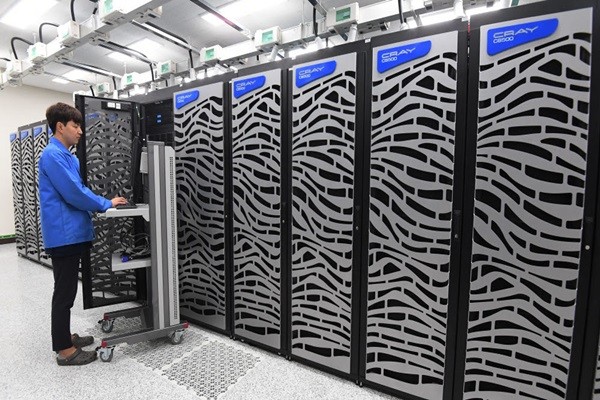A place for discussions on the era of “exascale” computing systems that are capable of billion billion calculations (1018) per second.is set to be held in South Korea.
The Korea Institute of Science and Technology Information (KISTI, President Choi Hee-yoon) is going to hold “2020 Korea Supercomputing Conference” from Wednesday to Thursday. This year’s conference, which will be celebrating its 17th conference this year, will be held online due to COVID-19.
The topic of this year’s conference is the “Arrival of Exascale Computing Era”. Researchers from various countries will talk about their respective countries’ progress in development of exascale computing. Four basic lectures, eight workshops on topics such as current trend on quantum computing, utilization of high-performance computing (HPC) against COVID-19, and HPC infrastructure for research on artificial intelligence (AI), and four community forums involving Korea Society for Computational Society and Engineering and astrophysics will be held during the conference.
The conference will kick off with an opening speech from President Choi Hee-yoon of the KISTI who is also the chairman of the organizing committee of Korea Supercomputing Conference at 10 A.M. “We hope that this year’s conference will be a place for basic scientific applications, ideas on utilization of supercomputers for key technologies such as AI, big data, and IoT (Internet of Things) related to the Fourth Industrial Revolution, and sharing of information between experts from different industries, universities, and research institutes.” said President Choi.
Won Kwang-yeon, who is the head director of National Research Council of Science & Technology, and Kim Bong-soo from the Ministry of Science and ICT are planning to give congratulatory messages through video.
The KIST Is also going to introduce outstanding results obtained through South Korea’s fifth supercomputer “Nurion” that was built in 2018. Nurion’s computing speed is 25.7 petaFLOPS (Floating Point Operations per Second) which was the 17th fastest speed out of top 500 supercomputers in the world as of June. Its speed was the 11th fastest speed in June of 2018.

Since Nurion’s opening ceremony in November of 2018, around 160 institutions and 3,000 researchers have conducted 4.37 million tasks using the supercomputer. Nurion is provided at no cost through the country’s “Super High-Performance Computing-Based Research and Development Innovation Support Program”.
KISTI selected 405 projects such as analysis and prediction of blood flow within narrow coronary artery and others that have utilized Nurion for 9.2 billion hours.
Researches on materials, eco-friendly energy, biotechnology, and cosmic evolution using Nurion have been producing world-class level results that include 275 scientific papers. The average citation index of these papers is 6.32, and most of them were published on top scientific journals.
KISTI also provided its assistance in interpreting the turbulent heat transfer phenomenon in extreme areas by providing 2,500 nodes. KISTI also developed and is providing a high-performance large-scale parallel processing technology that allows a use of 100,000 cores so that researchers can effectively tackle large issues.
Researchers are able to use 45 times more cores using Nurion than the KISTI’s fourth supercomputer. Spending time of Nurion has also increased by 25 times compared to the KISTI’s fourth supercomputer. Nurion’s operation rate remains above 99.5%.
“We are going to provide a research environment for South Korean researchers so that they can freely conduct research through our supercomputer and large-scale parallel processing technology and contribute to strengthening the nation’s competitive edge by developing world’s best AI algorithms.” said Yeom Min-seon who is the director of KISTI’s Super Computing Application Center.
“This year’s conference will show the progress of exascale computing development in the U.S., Japan, and China and how these countries are planning to utilize exascale computing and provide opportunities for close cooperation with these countries.” said Hwang Soon-ook who is the head of KISTI’s National Supercomputing Headquarters.
Staff Reporter Kim, Youngjoon | kyj85@etnews.com